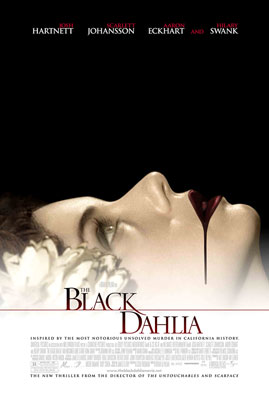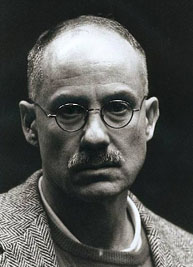 The first James Ellroy book I read was American Tabloid. I was working at the Wall Street Waldenbooks (which would become a Borders, move to the World Trade Center, get destroyed and then move back to Wall Street. Cyclical!), and really into JFK assassination theories. Like, I “acquired” every book in the store about it. One of my co-workers told me this Ellroy book had a great take on the killing, so I read it. After I read that I worked through everything else Ellroy had in print. It was his LA Quartet that really won me, and of those The Black Dahlia was my favorite. Now it’s an excellent film from Brian De Palma, a man whose perversions and obsessions and style fit perfectly with Ellroy.
The first James Ellroy book I read was American Tabloid. I was working at the Wall Street Waldenbooks (which would become a Borders, move to the World Trade Center, get destroyed and then move back to Wall Street. Cyclical!), and really into JFK assassination theories. Like, I “acquired” every book in the store about it. One of my co-workers told me this Ellroy book had a great take on the killing, so I read it. After I read that I worked through everything else Ellroy had in print. It was his LA Quartet that really won me, and of those The Black Dahlia was my favorite. Now it’s an excellent film from Brian De Palma, a man whose perversions and obsessions and style fit perfectly with Ellroy.
In the years after I read American Tabloid, Ellroy has only published one more novel, The Cold Six Thousand. He also published some collections of essays and short stories (a couple of which had to do with his mother, who was murdered when he was a boy. The case is unsolved), but like all Ellroy fans I have been hungering, year after year for the third book that will wrap up his Underworld USA trilogy. When I spoke to Ellroy I couldn’t get him to say much about the book. It was an interesting conversation, though – the whole thing clocked in at 8 minutes, but because Ellroy talks like his protagonists – clipped and quippy – I was able to ask more questions than I usually do.
Were you a fan of De Palma before he began working on Black Dahlia?
Ellroy: Yeah, I’m a fan of Brian De Palma. He’s a great filmmaker. He makes suffocatingly controlled, beautifully sensuous, obsessive movies. I dig him.
How hard it is for you as a writer to give up control of your books to someone else to make them into movies?
Ellroy: I don’t give a shit. Here’s the deal: they give you option money and it’s extremely unlikely that once your book has been optioned that you’ll make more than the option money. But it’s free dough, and I’ll always take the check. I’m a realist. The option is to the made movie what the first kiss is to the 50th monogamous anniversary. You have to be able to step aside and realize they’ll probably never make it into a movie, and if they do they’ll fuck it up beyond all redemption, but in the meantime you’ve been compensated.
Your own mother’s murder is a big part of why you used the Black Dahlia murder in this book. What is the line for you between using that kind of a personal experience, which you have gone back to in other stories and essays, and getting into exploitation?
Ellroy: I do not shy away from the verb exploit. I have exploited my mother’s death to sell books, and I am doing it now. That stated, this film tour I’m on now marks the end of this for me. After this entire run of movie brouhaha I will never discuss my personal life or my mother’s murder case again. I have talked it to death. But in the meantime, daddy-o, I’m happy to be talking to you.
Isn’t it impossible for a writer to not talk about his personal life? Doesn’t your personal life and your personal obsessions come out in the work anyway?
Ellroy: I try to limit it to some level of abstraction. I’ll also be a big obsessed guy, but I don’t need to tell my story for the rest of my life. It’s implicit, and if any interviewer doesn’t know my story, their homework.
With The Cold Six Thousand your prose style has become more hard boiled and more terse than ever. Where is there to go now – are you down to sentences that are just one word?
Ellroy: The next novel, which is the sequel to Cold Six Thousand, employs a more fully explicated style. I think it will shock readers, the utter formality of it. Look for it in two years.
 How does that happen? How do you decide on what kind of a style to use when writing a novel?
How does that happen? How do you decide on what kind of a style to use when writing a novel?
Ellroy: The story always mandates the style. Take for example The Black Dahlia, and I’m assuming you’ve read the novel. It’s a fully explicated style because it comes from a classic tradition: Bucky Bleichart is a young man telling the story of the one great adventure in his life. You can’t do verbal tricks because implicit in that is that he’s an amateur memoirist. In short the story of the book always mandates the style of the book.
The sequel to The Cold Six Thousand, which you haven’t titled or haven’t announced the title of yet, is your last novel set outside of LA?
Ellroy: That’s right. I’m going to write LA novels exclusively from that point on, but I don’t know what they will be.
Where does next novel take us? The last two have taken us on a tour of the darker sides of American history and our foreign involvement. Where do we go now?
Ellroy: Volume 1 of the Underworld USA trilogy goes from ’58-’63. Volume 2 goes from ’62-’68. The new book goes from ’68-’72. It’s more Vietnam. There’s Cuba, there’s Nicaragua. There are crazy black militants, there are the two political conventions of ’68. Mop-up on the RFK and MLK hits. All sorts of shit.
Are you a writer who feels most comfortable in the past? Is it possible that after the Underworld USA books you’ll find yourself writing something set in the present?
Ellroy: I will never write in the present. I like to go back and rewrite history to my own specifications.
What’s history to you now? Are the 80s history?
Ellroy: The 80s, 90s and up are entirely too contemporary and new.
You’ve been dabbling in screenwriting. What’s your future in film?
Ellroy: I write movies for a lot of money and the movies don’t get made. I only do it for the dough.
Is it frustrating to put work into that and it never gets seen?
Ellroy: Absolutely not frustrating because I have it compartmentalized in my mind.
So because you’re not expecting it to be made you’re not putting your best stuff there.
Ellroy: I’m not. The movie work that I do – screenplays are a simple form compared to the novel. I write these films to the best of my ability. But motion picture dysfunctionality, the high cost of making motion pictures, the numerous people involved, the entire process, trumps the reality of getting things made much of the time. I don’t hold out much hope and in the meantime the books are forever.
What’s the status of American Tabloid or The Cold Six Thousand becoming movies?
Ellroy: They are at HBO and they will probably never be made.
I understand you really like The Black Dahlia the movie, so doesn’t it make you curious about what someone with equal talent might do with your work?
Ellroy: I don’t think about it. Here’s why: I got a book to write, I’ve got a torturous love life to try to manipulate. I got shit to do, man. I got shit to do.
What are you reading these days?
Ellroy: I read nothing. I read nothing. I lie in the dark in my pad, crank the air conditioning, scratch my balls and obsess on women.
Well whatever it takes to write those novels, I’m happy you’re doing it.
Ellroy: A lot of ball scratching is what it takes.
I think the aspiring authors in our audience will be happy to hear that, because they probably have that part of the process down pat.
Ellroy: Ball scratching. Ball scratching. Leg scratching for the women in the audience.